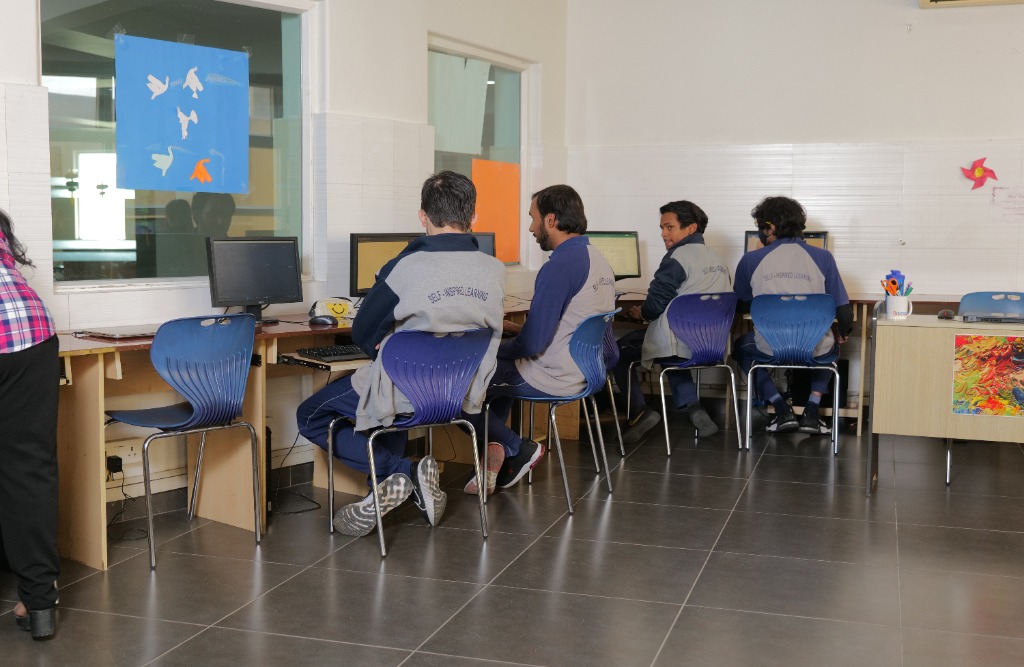Have you seen sci-fi movies showing how future kids learn way differently than previous generation students? Like chatbots answering student queries 24*7, virtual tutors breaking down complex topics into easy-to-digest information bits, AI-powered assessment systems grading student’s knowledge levels, and so on. While we all may have expressed awe at those situations and forgotten them as fictional stories, they are making their way into present-day classrooms. The future is already here and actively disrupting the education landscape as we know it today.
We at Excelsior American School, being one of the most trusted Top international schools in Gurgaon, have been closely monitoring tech advancements relevant to education and have found that AI is here to stay. We firmly believe that contrary to the widely spread myth, the adoption of AI in the education sector though won’t be able to replace teachers but will definitely help them focus more on what they do best – inspiring, mentoring, and bringing out the best in each student with a touch of empathy and sensitivity. Integrating AI into daily educational journeys is going to be a big win for both educators and students. So, instead of resisting it or setting unrealistic expectations, it will be better to explore ways to use it wisely.
To make it easier, we have condensed the top opportunities and ethical concerns in this blog post so you can use the information to make informed decisions. So, let’s explore the potential opportunities and ethical considerations shared below.
Massive Opportunities Brought by AI You Cannot Ignore
While AI is no longer new, it is still nascent. It will evolve with time, becoming more sophisticated, fast, and reliable. While this modern tech has already reached students’ and educators’ hands, people are still trying to explore the best ways to use AI for improved learning outcomes. After delving this advanced technology extensively, we at Excelsior American School have found the following best ways of leveraging AI in the education field.
- Creating Personalized Learning Paths
Though we won’t call it something impossible but yes, it is definitely difficult for teachers to individually monitor each student and create individualized learning paths based on their unique strengths, weaknesses, and preferred learning styles. AI can help make this possible. However, it will only deliver the best results when teachers and AI work collaboratively. Our teachers and administration have been taking necessary steps to integrate AI into our teaching processes, so each student gets a personalized learning path optimized for maximizing their potential.
- Predictive Analytics for Timely Intervention
One of the best ways to use AI in education is by using its predictive analytics feature to continuously monitor students’ behavior and performance. It can help teachers identify potential academic challenges that are unique to individual students, prompting them to offer timely intervention and support. This simple approach can save many students from falling behind, aiding their overall growth.
- Offering Instant Response to Queries
Though teachers generally try their best, it often happens at times that they cannot respond to students’ queries, especially after school hours. It often acts as a bottleneck in many students’ growth pace. However, the introduction of AI has solved this problem forever. Students can now use chatbots designed for specific subjects to get instant answers/support to their queries/challenges. Besides offering relevant solutions, these powerful AI tools can also provide additional resources to sharpen the student’s area of concern, thereby helping to bridge the knowledge gap.
- Efficient Administrative Processes
AI has its use cases beyond teaching, making it one of the most potent technologies launched to date. The top educational institutes worldwide have already started using AI to streamline their administrative activities, such as automating admissions, enrollments, grading assessments, etc., freeing up significant time and resources that can be diverted to more strategic tasks.
Be Aware of Ethical Considerations Before Using AI in Education
While AI offers lucrative opportunities in the education field, it also comes with its fair share of drawbacks. AI has already gained backlash for its biases, fairness policies, and privacy concerns. Since AI is trained on a gigantic data set, its responses are as unbiased as the used data. So, if major platforms have not trained their AI models on a diverse data set, chances are high that it may generate inaccurate and biased information.
Both students and educators must exercise their discerning abilities and not become overly reliant on this tech. As more people integrate AI into their daily learning experiences, AI models will continue collecting and storing user data. It raises strong privacy concerns for every user, creating a need for strong regulatory guidelines to safeguard end users. In this regard, we at Excelsior American School is the Best International School in Gurgaon, regarded as one of the leading schools in Gurgaon, believe that technology is undoubtedly a powerful tool, but overreliance on this tech can significantly hinder social interaction skills and cognitive abilities, and this holds true for both adults and children alike.
Conclusion
The future of education is not about pitting humans against machines; it’s about creating a harmonious balance where technology empowers teachers and personalizes learning for every student. By integrating AI ethically and responsibly, we can unlock a future where education is truly accessible, engaging, and effective for all. So, let’s embrace the opportunities AI presents while navigating the ethical complexities with wisdom and foresight. We believe the future of learning is bright, and AI can be the fuel driving it towards even greater heights.


